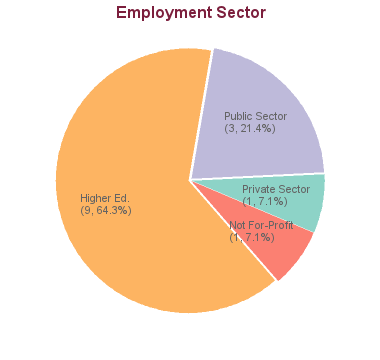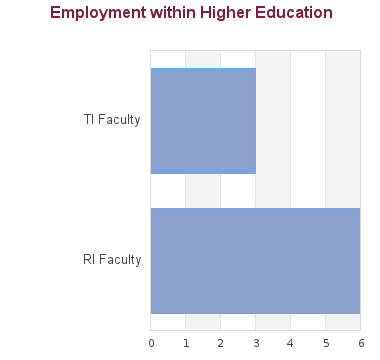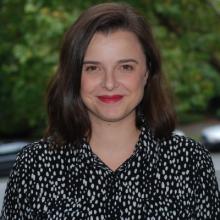Canadian Immigration Updates
Review details about the recently announced changes to study and work permits that apply to master’s and doctoral degree students. Read more
Overview
The Special Education program at UBC concerns the education of students with exceptionalities, such as students with visual impairments, developmental disabilities, emotional or behavioural disorders, learning disabilities, gifts and talents, and those who are deaf or hard of hearing. Faculty are committed to promoting practices that facilitate inclusion, empowerment, and self-determination of individuals with disabilities and other special needs in home, school, and community settings.
What makes the program unique?
- Only university in the country to offer graduate coursework in special education across all areas of exceptionality.
- Opportunities for practical experiences with a variety of district and community partnerships.
- We offer opportunities for research and funding through faculty partnerships.
- We offer opportunities to change practice for the better through Special Education faculty initiatives.
- Outstanding support through a world-class faculty and staff to guide you on your academic journey!
Quick Facts
Program Enquiries
Contact the program
Admission Information & Requirements
1) Check Eligibility
Minimum Academic Requirements
The Faculty of Graduate and Postdoctoral Studies establishes the minimum admission requirements common to all applicants, usually a minimum overall average in the B+ range (76% at UBC). The graduate program that you are applying to may have additional requirements. Please review the specific requirements for applicants with credentials from institutions in:
Each program may set higher academic minimum requirements. Please review the program website carefully to understand the program requirements. Meeting the minimum requirements does not guarantee admission as it is a competitive process.
English Language Test
Applicants from a university outside Canada in which English is not the primary language of instruction must provide results of an English language proficiency examination as part of their application. Tests must have been taken within the last 24 months at the time of submission of your application.
Minimum requirements for the two most common English language proficiency tests to apply to this program are listed below:
TOEFL: Test of English as a Foreign Language - internet-based
Overall score requirement: 90
Reading
22
Writing
21
Speaking
21
Listening
22
IELTS: International English Language Testing System
Overall score requirement: 6.5
Reading
6.0
Writing
6.0
Speaking
6.0
Listening
6.0
Other Test Scores
Some programs require additional test scores such as the Graduate Record Examination (GRE) or the Graduate Management Test (GMAT). The requirements for this program are:
The GRE is required by some applicants. Please check the program website.
2) Meet Deadlines
September 2026 Intake
Application Open Date
20 September 2025Canadian Applicants
International Applicants
3) Prepare Application
Transcripts
All applicants have to submit transcripts from all past post-secondary study. Document submission requirements depend on whether your institution of study is within Canada or outside of Canada.
Letters of Reference
A minimum of three references are required for application to graduate programs at UBC. References should be requested from individuals who are prepared to provide a report on your academic ability and qualifications.
Statement of Interest
Many programs require a statement of interest, sometimes called a "statement of intent", "description of research interests" or something similar.
Supervision
Students in research-based programs usually require a faculty member to function as their thesis supervisor. Please follow the instructions provided by each program whether applicants should contact faculty members.
Instructions regarding thesis supervisor contact for Doctor of Philosophy in Special Education (PhD)
Citizenship Verification
Permanent Residents of Canada must provide a clear photocopy of both sides of the Permanent Resident card.
4) Apply Online
All applicants must complete an online application form and pay the application fee to be considered for admission to UBC.
Tuition & Financial Support
Tuition
| Fees | Canadian Citizen / Permanent Resident / Refugee / Diplomat | International |
|---|---|---|
| Application Fee | $116.25 | $168.25 |
| Tuition * | ||
| Installments per year | 3 | 3 |
| Tuition per installment | $1,875.34 | $3,294.66 |
| Tuition per year (plus annual increase, usually 2%-5%) | $5,626.02 | $9,883.98 |
| Int. Tuition Award (ITA) per year (if eligible) | $3,200.00 (-) | |
| Other Fees and Costs | ||
| Student Fees (yearly) | $1,144.10 (approx.) | |
| Costs of living | Estimate your costs of living with our interactive tool in order to start developing a financial plan for your graduate studies. | |
All fees for the year are subject to adjustment and UBC reserves the right to change any fees without notice at any time, including tuition and student fees. Tuition fees are reviewed annually by the UBC Board of Governors. In recent years, tuition increases have been 2% for continuing domestic students and between 2% and 5% for continuing international students. New students may see higher increases in tuition. Admitted students who defer their admission are subject to the potentially higher tuition fees for incoming students effective at the later program start date. In case of a discrepancy between this webpage and the UBC Calendar, the UBC Calendar entry will be held to be correct.
Financial Support
Applicants to UBC have access to a variety of funding options, including merit-based (i.e. based on your academic performance) and need-based (i.e. based on your financial situation) opportunities.
Program Funding Packages
From September 2024 all full-time students in UBC-Vancouver PhD programs will be provided with a funding package of at least $24,000 for each of the first four years of their PhD. The funding package may consist of any combination of internal or external awards, teaching-related work, research assistantships, and graduate academic assistantships. Please note that many graduate programs provide funding packages that are substantially greater than $24,000 per year. Please check with your prospective graduate program for specific details of the funding provided to its PhD students.
Average Funding
- 5 students received Teaching Assistantships. Average TA funding based on 5 students was $4,841.
- 9 students received Research Assistantships. Average RA funding based on 9 students was $11,256.
- 3 students received Academic Assistantships. Average AA funding based on 3 students was $8,164.
- 12 students received internal awards. Average internal award funding based on 12 students was $17,100.
- 2 students received external awards. Average external award funding based on 2 students was $27,500.
Review methodology
Scholarships & awards (merit-based funding)
All applicants are encouraged to review the awards listing to identify potential opportunities to fund their graduate education. The database lists merit-based scholarships and awards and allows for filtering by various criteria, such as domestic vs. international or degree level.
Graduate Research Assistantships (GRA)
Many professors are able to provide Research Assistantships (GRA) from their research grants to support full-time graduate students studying under their supervision. The duties constitute part of the student's graduate degree requirements. A Graduate Research Assistantship is considered a form of fellowship for a period of graduate study and is therefore not covered by a collective agreement. Stipends vary widely, and are dependent on the field of study and the type of research grant from which the assistantship is being funded.
Graduate Teaching Assistantships (GTA)
Graduate programs may have Teaching Assistantships available for registered full-time graduate students. Full teaching assistantships involve 12 hours work per week in preparation, lecturing, or laboratory instruction although many graduate programs offer partial TA appointments at less than 12 hours per week. Teaching assistantship rates are set by collective bargaining between the University and the Teaching Assistants' Union.
Graduate Academic Assistantships (GAA)
Academic Assistantships are employment opportunities to perform work that is relevant to the university or to an individual faculty member, but not to support the student’s graduate research and thesis. Wages are considered regular earnings and when paid monthly, include vacation pay.
Financial aid (need-based funding)
Canadian and US applicants may qualify for governmental loans to finance their studies. Please review eligibility and types of loans.
All students may be able to access private sector or bank loans.
Foreign government scholarships
Many foreign governments provide support to their citizens in pursuing education abroad. International applicants should check the various governmental resources in their home country, such as the Department of Education, for available scholarships.
Working while studying
The possibility to pursue work to supplement income may depend on the demands the program has on students. It should be carefully weighed if work leads to prolonged program durations or whether work placements can be meaningfully embedded into a program.
International students enrolled as full-time students with a valid study permit can work on campus for unlimited hours and work off-campus for no more than 24 hours a week during academic sessions.
A good starting point to explore student jobs is the UBC Work Learn program or a Co-Op placement.
Tax credits and RRSP withdrawals
Students with taxable income in Canada may be able to claim federal or provincial tax credits.
Canadian residents with RRSP accounts may be able to use the Lifelong Learning Plan (LLP) which allows students to withdraw amounts from their registered retirement savings plan (RRSPs) to finance full-time training or education for themselves or their partner.
Please review Filing taxes in Canada on the student services website for more information.
Cost Estimator
Applicants have access to the cost estimator to develop a financial plan that takes into account various income sources and expenses.
Career Outcomes
16 students graduated between 2005 and 2013. Of these, career information was obtained for 14 alumni (based on research conducted between Feb-May 2016):


RI (Research-Intensive) Faculty: typically tenure-track faculty positions (equivalent of the North American Assistant Professor, Associate Professor, and Professor positions) in PhD-granting institutions
TI (Teaching-Intensive) Faculty: typically full-time faculty positions in colleges or in institutions not granting PhDs, and teaching faculty at PhD-granting institutions
Term Faculty: faculty in term appointments (e.g. sessional lecturers, visiting assistant professors, etc.)
Sample Employers in Higher Education
University of British Columbia (2)Capilano University (2)
University of Minnesota - Twin Cities
Royal Roads University
University of Bahrain
Douglas College
University of Manitoba
Sample Employers Outside Higher Education
Canucks Autism NetworkWinnipeg School Division
BC Provincial Government
Coquitlam School District
Sample Job Titles Outside Higher Education
Director of ProgrammingSchool Psychologist
Senior Behavioural Consultant
Director; Owner
Psychologist
PhD Career Outcome Survey
You may view the full report on career outcomes of UBC PhD graduates on outcomes.grad.ubc.ca.Disclaimer
These data represent historical employment information and do not guarantee future employment prospects for graduates of this program. They are for informational purposes only. Data were collected through either alumni surveys or internet research.Enrolment, Duration & Other Stats
These statistics show data for the Doctor of Philosophy in Special Education (PhD). Data are separated for each degree program combination. You may view data for other degree options in the respective program profile.
ENROLMENT DATA
| 2023 | 2022 | 2021 | 2020 | 2019 | |
|---|---|---|---|---|---|
| Applications | 8 | 11 | 22 | 11 | 6 |
| Offers | 2 | 2 | 3 | 3 | 3 |
| New Registrations | 0 | 2 | 3 | 3 | 3 |
| Total Enrolment | 14 | 16 | 16 | 14 | 14 |
Completion Rates & Times
Disclaimer
Upcoming Doctoral Exams
Wednesday, 23 April 2025 - 9:00am
Research Supervisors
Supervision
Students in research-based programs usually require a faculty member to function as their thesis supervisor. Please follow the instructions provided by each program whether applicants should contact faculty members.
Instructions regarding thesis supervisor contact for Doctor of Philosophy in Special Education (PhD)
Advice and insights from UBC Faculty on reaching out to supervisors
These videos contain some general advice from faculty across UBC on finding and reaching out to a supervisor. They are not program specific.
Doctoral Citations
| Year | Citation |
|---|---|
| 2010 | Dr. Richardson articulated an arts-based approach to researching an individual's gifts and talents. In this way she showed how one's inner-gifts are expressed through one's emotional and relational contexts. Her work challenges objective and technical ways of understanding inner-gifts within the field of education. |
| 2010 | Dr. Fossett examined the effectiveness of a staff-training program in behavior assessment and intervention for deaf children with additional disabilities. Following training, a Deaf staff implemented the procedures with a deaf child with multiple disabilities and his family. Improvements in child behavior and participation suggest an avenue for supporting this unique population. |
| 2010 | Dr. MacKinnon McQuarrie used cortisol levels in saliva as a physiological index to measure children's reactivity to stress while completing tasks believed to underlie Math Disability. Higher levels of reactivity predicted poorer performance on working memory and math tasks, processes that are impaired in children with Math Disability. |
| 2009 | Dr. Binnendyk investigated the effectiveness of a behavioural feeding intervention that aimed to improve child eating and parent-child interaction during mealtime for families of children with developmental disabilities and feeding problems. Her study is the first in the feeding literature to document a transformation of parent-child relationships in family meals. |
| 2009 | Dr Song explained with an integrated model of human abilities why and how gifted students and gifted students with learning disabilities are different from each other in terms of ability and feeling. The characteristics of different groups of gifted students were explained better by the model than by the major models that informed it. |
| 2008 | Dr. Katz's doctoral research involved the creation of a school program to develop compassionate learning communities by involving students in activities that made them aware of individual differences and the value of diversity. The program increased students' self-respect and respect for diverse others, and reduced bullying and discrimination. |
Pages
- « first
- ‹ previous
- 1
- 2
- 3
Sample Thesis Submissions
Further Information
Specialization
The Special Education area concerns the habilitation and education of students with exceptionalities, such as students with visual impairments, physical disabilities, emotional or behavioural disorders, learning disabilities, developmental disabilities, and students who are deaf or hard of hearing. The program also includes a focus on gifted and talented students.
Program Website
Faculty Overview
Program Identifier
Classification
September 2026 Intake
Program Enquiries
Contact the program
Departments/Programs may update graduate degree program details through the Faculty & Staff portal. To update contact details for application inquiries, please use this form.

Considering UBC for your graduate studies?
Here, you can choose from more than 300 graduate degree program options and 2000+ research supervisors. You can even design your own program.




